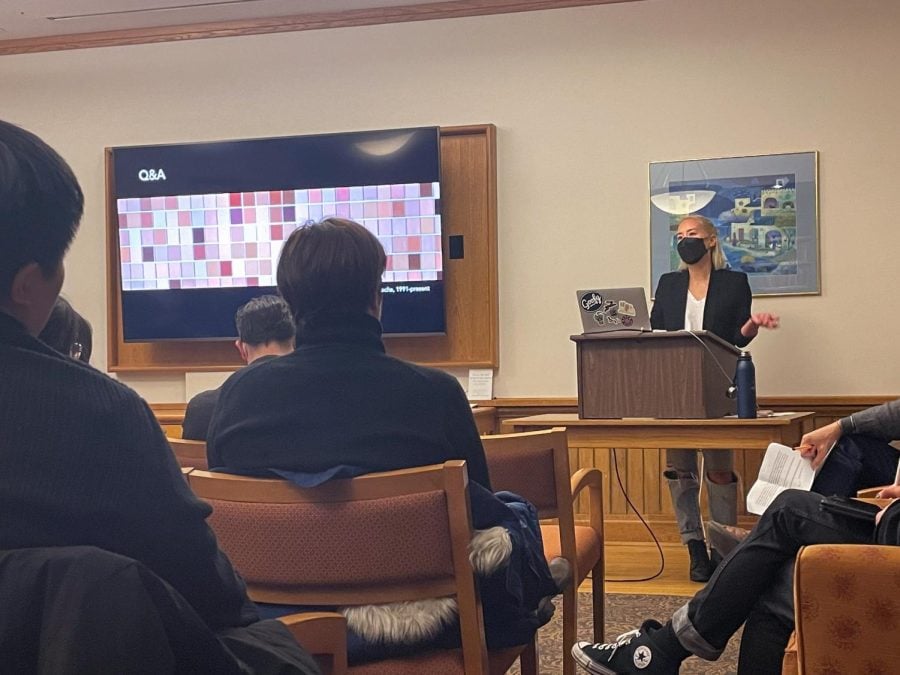Prof. Michelle Huang parallels fiction with reality in lecture on racial disparities in Asian American literature
Beatrice Villaflor/The Daily Northwestern
Prof. Michelle Huang lectured to an audience of about 40 in the Hagstrom Room on Monday as part of the Klopsteg lecture series.
February 27, 2023
English and Asian American studies Prof. Michelle Huang discussed at a Monday event how Asian American dystopian fiction provides a case study through which healthcare inequities could be analyzed.
“Reading contemporary Asian American literature chiefly through proximity to or exclusion from whiteness fails to grasp how it fits into a broader racial formation,” Huang said.
About 40 community members gathered in University Hall to listen to Huang parallel Chang-rae Lee’s “On Such A Full Sea.”
The lecture, titled “Racial Disintegration: Biomedical Futurity at the Environmental Limit,” is part of the Klopsteg Lecture Series, a long-standing series of talks organized by the Science in Human Culture program.
“‘On Such A Full Sea’ and other Asian American dystopian fiction … (frames) racism as a symptom, rather than as the underlying cause, of inequitable healthcare,” Huang said.
Huang centered the idea of “studious deracination,” analyzing how race marginalizes minority groups — even in situations where people claim race is irrelevant.
Second-year English Ph.D. student Ryan Nhu said he found this idea to be a helpful analytic when discussing race — not just in literature, but also in broader campus conversations.
“On a personal note, I was moved by (Huang’s anecdotes),” Nhu said. “‘Studious deracination’ is an interesting aesthetic observation she’s making, but it’s rooted in a personal history.”
Huang used studious deracination to illustrate inequities in the treatment of Black, Latine and Indigenous patients.
Specifically, Huang took issue with precision medicine, in which healthcare providers target the individual’s genome sequence in order to find a personalized cure. Huang found these providers never acknowledged that the medicine would go to the richest, rather than equitably help society as a whole.
“Race cannot be encapsulated inside a single body, yet claims that biomedical development renders race obsolete persist,” Huang said.
Huang highlighted how minority populations have historically been used as medical test subjects — often against their own will.
She also referred to her own experiences with precision medicine and her observations of inequalities at local institutions like Northwestern Memorial Hospital.
“The precision medicine approach hinders healthcare quality by ignoring that race is constituted not individually, but by neighborhoods and communities and larger scale systems,” Huang said.
Weinberg senior Cindy Shou said that Huang has been a mentor to her since she took Asian American Studies 275: Introduction to Asian American Literature last year. She attended the talk because she thought Huang’s literary analysis corresponds to issues within the public health sphere.
On a similar note, second-year English Ph.D. student Yasmin Yoon said she was struck by how Huang covered multiple disciplines in her talk.
“Professor Huang’s work is a very important intervention into common understandings about what we think about race and how we read race, not just in literature but in people,” Yoon said.
After her lecture, attendees asked Huang about her personal motivations to pursue her field.
Huang said the discourse around race was stagnant, which she said is why there is controversy around it being taught in schools.
She added she often teaches undergraduate students who are shocked upon realizing their ignorance of Asian American history.
Huang said it was not the students’ fault that they had not learned their own histories. However, she said students would know more if Asian American studies were a part of the common curriculum starting from preschool.
“I’m a professor of Asian American studies, and I’ve never taken an Asian American studies class in my life,” Huang said. “So (my students) are very much ahead of me.”
Email: [email protected]
Twitter: @beatricedvilla
Related Stories:
— Professors break down racial and LGBTQ+ health disparities in forum
— University of Illinois Prof. Hogarth talks eugenics and its roots in slavery
— Artists explore theme of equality at multi-disciplinary Arts Circle event












